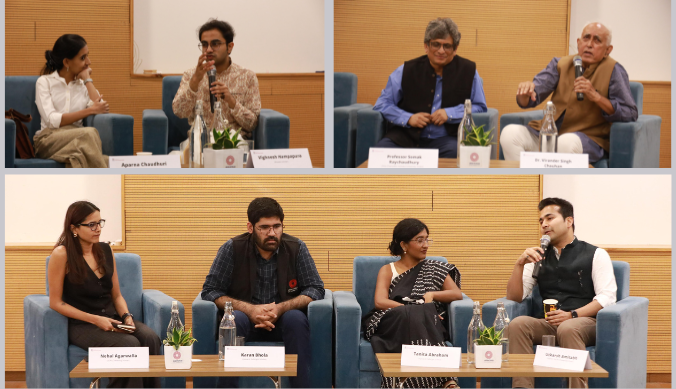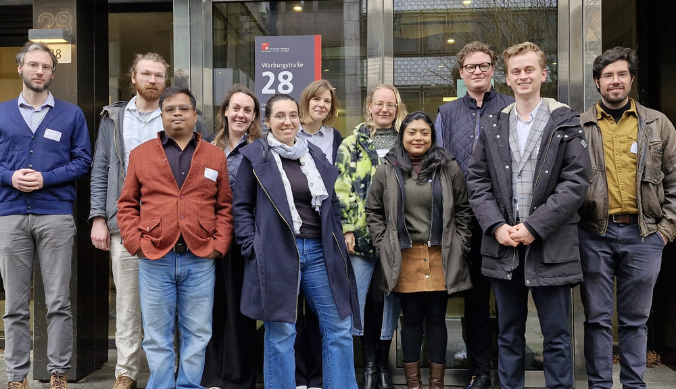Building the Infrastructure for Evidence-Driven Discussions and Decision Making
Abhay Gupta elaborates on CEDA's mission-driven approach and its commitment to provide error-free, robust data and objective, useful analysis on important topics
The Centre for Economic Data and Analysis (CEDA) has embarked on a mission to support scientific discovery and objective decision-making processes in the socio-economic context for researchers, organisations, policymakers, and individuals.
CEDA aims to achieve its mission by
- building organised, feature-rich, easily searchable datasets
- generating value-added, informative, reproducible indexes
- producing useful, interesting, timely analysis
- creating productivity-enhancing, standardised toolkits
- organising relevant, focused discussions
- developing with diverse range of applications
- fostering a network of adopters of evidence-driven decision-making practices
- impacting real-world outcomes through knowledge-based global public goods.
Anonymised public data and the need for statistics
In today’s world, a huge quantity of new data is generated every second. From individuals doing online shopping and posting social media comments to governments recording unique identification to provide services to investors buying assets in financial markets. Currently, the publicly available data including official statistics is shared on various sites in the form of individual datasets. There are many data aggregator sites that organise these datasets by source or category and offer different ways to access them. But the current public data landscape is fraught with issues.
- Mismatch in values of data from different sources
- Mismatch in values of indicator estimated using different datasets
- Inconsistency, breaks, jumps within dataset or series
- Lack of standardized codification
- Changes in estimation methodologies
- Re-classification of categories
- Different publishers doing different data conversion/ weighting
CEDA has gone through the rigorous process of eliminating the errors and dealing with the above-mentioned issues for some of the most used and most useful socio-economic public datasets for India like the Census, NSS, PLFS etc. CEDA data portal allows free access to these datasets to everyone.

(as of August 2023)
Future Plans: At CEDA, we are building a meta-data-driven architecture for mapping and storing any type of data: people, organisations, state actors and their characteristics, transactions with time and location. Using the state-of-the-art technology CEDA data infrastructure will power our web portal, offering users a range of functionality.

Value of objectivity of an independent centre
There has been a recent rise in the use of “biased data” in social media. People have started treating the socio-economic indicators in many countries (including India) as the report card of the government’s performance. The governments have also responded to these trends by carefully monitoring what gets released as official statistics. CEDA, which is based at Ashoka University, is in a unique position to bring to its users data they can trust and use by expanding the coverage and outreach of its data portal. CEDA uses reliable data in the public domain and summarises it to make it usable to a wide variety of stakeholders
There are many advantages of the CEDA model compared to other data websites.
- No incentive misalignment
- Automation and separation of data creation process from analysis results
- Creation of public good – Others can focus on analysis rather than dataset cleaning
- Standardisation and harmonisation based on published research
- Objectivity and comparability due to the use of internationally accepted methodologies
In addition to providing the data from different sources, CEDA is also planning to create its own value-added indexes, indicators and datasets. There are many examples across the world where university-based centres or non-profit think tanks have taken responsibility for producing important data.
- GTAP Dataset
- Penn World Tables
- U Michigan Survey Research Centre
- Harvard Atlas of Economic Complexity.
- MIT Billion Prices project
- Conference Board Consumer Confidence and Labor Market Indexes
- Groningen Growth and Development Centre World Input-Output Database
Future Plans: For the datasets created by CEDA, we will be creating detailed information maps (e.g. data notes, concordance tables) to ensure that each number can be traced to its origin. Our structural approach will also make it easier to implement any changes (e.g. change in industry classification or state boundaries) seamlessly.
Macro trends to micromechanisms: The science of economic decision making
Considering one of the most cited economic statistics, the GDP growth rate can help in understanding the nuances involved in economic decision-making. There is a large literature on comparing the growth rate of India before and after the economic reforms of the early 1990s. However, there is disagreement about the exact growth rates and the “sources of growth”. There is no consensus on how much of this growth surge was due to liberalisation (opening of the economy).
CEDA offers a rich set of analytical content, much of which is generated using the datasets available at the CEDA data portal. With a wider audience in mind, the content showcases the power of data to generate interesting and useful insights.

(as of August 2023)
Future Plans: In addition to investing in building the data infrastructure, CEDA is constantly working on creating new content – from producing regular data analysis pieces mentioned in the table to conceptualising and designing new content types that provide unique insights and help our users in making better decisions in their work or personal lives or have informed discussion.

Enabling a culture and supporting framework for objective discussions
Failure to predict the 2008 crash is just one of many examples of collective blindsight. From the role of government vs. markets to globalisation vs. industrial policies, there are disagreements everywhere. A methodological and collaborative approach to discussion and consensus formation is the need of the hour. CEDA plans to fulfil that need by undertaking a diverse set of outreach activities.
In the private sector, the value of data and analysis is readily understood. But in many other places, the decisions are still made either based on gut feeling or assuming the set-in-stone type of relationship. By showcasing the value of data-driven, objective analysis for different stakeholders, CEDA will increase the real-world impact of the digital public goods it is creating. Accurate and timely data and statistics will play an increasingly crucial role in ensuring that the right decisions are made.

Future Plans: Through publicising the benefits of engagement, CEDA plans to build a network of partners and power users who will act as ambassadors to our approach. We will create user manuals, how-to guides, and instructional videos; organise webinars and events; co-host thematic discussions and expert forums; design and run internship programs; and build and promote online hubs for information exchange.
A future with dashboards, auto-generated insights, data alerts and CEDA applications
Outlining “what CEDA could be” is a good motivator for us to work hard to take the organisation in that direction. The technology will help CEDA distinguish itself from numerous other centres and organisations. Innovative use of data and designing useful applications will enable our current and future users to make better and more informed decisions. For example, satellite imagery data to find the development impact of road connectivity or mobile location data to study migration patterns or estimate government service delivery efficiency.

Being a centre of excellence at one of the leading universities in India, CEDA can make a significant contribution towards facilitating informed discussion and efficient decision-making. Recognising this responsibility, CEDA is committed to providing error-free, robust data and objective, useful analysis on important topics. We have ambitious yet realistic plans to expand our data coverage and analysis content while creating a network of users and partners who can help us scale up. With its focused approach, CEDA will likely make a measurable impact in India achieving inclusive economic growth.
(Abhay Gupta is the Director of the Centre for Economic Data and Analysis (CEDA), Ashoka University)
Study at Ashoka













